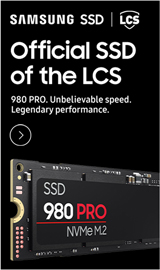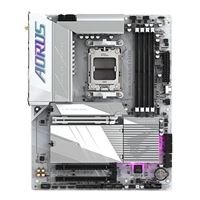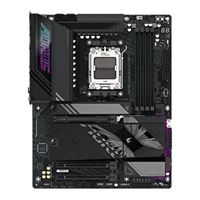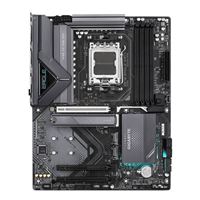Selecting an AMD Motherboard
The motherboard is the foundation of your whole PC build, and since everything from your CPU to storage drives and RAM connects to your motherboard, the motherboard you choose will have a huge effect on component compatibility. If you have decided to use an AMD Ryzen CPU in your PC build, it’s crucial to choose an AMD based motherboard to go with it. Those planning to use an Intel CPU should seek out an Intel based motherboard instead. So how can you choose the right AMD motherboard for you? It starts with understanding the chipsets and socket designs that AMD motherboards use.
Chipsets and Sockets on AMD Motherboards
Chipsets such as the AMD B550 and AMD B450 help to differentiate between the features and uses of various AMD motherboards. Along with the chipset, the socket of the motherboard will confirm which CPU the component supports. B550 based motherboards are the most popular among AMD processors because they feature rich components at an affordable price. The highlights of B550 motherboards include USB 3.2 ports, multiple high speed PCIe lanes, and the possibility of integrated WiFi 6 capabilities. B450 based motherboards function similarly to B550 and feature the same socket but can be limited to more basic features or lesser peripheral support. Both the B450 and B550 chipsets make for excellent gaming motherboards. Deciding between the two will be up to you and what other features you wish to have in your final gaming PC build.
As for sockets, it is all about the configuration of the pin connectors that the CPU uses to connect to the motherboard. The AMD AM4 socket design is the one currently in use on AMD motherboards, but the next gen AM5 socket motherboards will begin appearing soon and will likely be required for PC builders who want to use the latest and greatest AMD Ryzen processors.
Want to skip the potential confusion and frustration of trying to ensure your CPU is compatible with your motherboard, or even worse, of troubleshooting connectivity issues later? Micro Center offers a full range of CPU and motherboard bundles that make an ideal foundation for your PC build. Just choose your specs and go — no research or BIOS flashing required.
Considering Form Factor on AMD Motherboards
Both chipsets will also come in multiple form factors or sizes, which means viable options are available for just about any PC build. Your choice of form factor will determine what type of PC case fits your motherboard, and thus the general size and footprint of your entire desktop PC rig, as well as the amount of component slots available for your use.
ATX motherboards are the most common form factor because they are among the largest and easiest to build with, as well as being the most readily available. The newer eATX form factor, the largest of all, offers abundant extras such as additional PCIe slots that can be used for extra memory, WiFi cards, and many other purposes. However, ATX and eATX also necessitate larger PC cases.
Smaller motherboard form factors such as microATX or Mini ITX are great for office based machines or any computer that has to fit within a limited space. However, building on a Mini ITX footprint compared to an ATX motherboard can be more challenging for other reasons, including cable management and layout challenges.
Whatever form factor you choose, be sure to consider which external ports it offers. Almost every motherboard will include basics like HDMI, USB-C and DisplayPort, but additional ports can vary widely.
Micro Center’s selection of AMD motherboards includes options from all of the top motherboard manufacturers, including MSI, ASUS, Gigabyte, and more. If you would like an even easier way to get started, make sure to check out our CPU motherboard bundle packages, and see our selection of Intel motherboards if you have not made up your mind about which CPU brand to use yet.
Selecting a Motherboard
Looking to build your own PC? Don’t overlook the importance of the motherboard. This is the printed circuit board that contains the primary components of your device, featuring all the connections and slots that allow your CPU, GPU, hard drive, and other components to interact. While it may not get as much attention as your graphics card or processor, the motherboard is important because it allocates power and keeps all hardware working in sync.
The motherboard is at the core of any PC build. Motherboards come in different shapes, sizes, and chipsets that determine what other components are supported by your computer. Understanding what features the different chipsets offer can help you determine which motherboard is the right choice for you.
Typically, you can see the chipset of a motherboard within the parts name, such as the ASRock X570 Taichi ATX or ASUS Z690-A LGA 1700 ATX. The name of these components will tell you many things, including which processor the board supports, the form factor of the part, and other features such as integrated WiFi. Intel processors and AMD processors require specific sockets to function, and a motherboard will only support one brand.
Intel and AMD Motherboards
A motherboard's chipset can tell you which processor the board supports and other additional features. AMD B550 motherboards use AMD AM4 socket and are some of the most popular on the market today. These boards often support multiple graphics cards, integrated WiFi 6, and USB 3.2 ports, making them great motherboards for gaming or workstation style PCs.
A popular choice is AMD B450 motherboards. The differences between B550 and B450 are minor, and supported peripheral components are similar, making either an excellent choice. AMD X570 motherboards are considered top of the line for AMD processors and offer the most robust features and build flexibility. These boards can come at a premium price, however features such as support for multiple high speed storage drives or GPUs make them highly desired for streaming PCs or workstation style computers.
If you need a motherboard that is compatible with Intel processors, be sure to select an Intel motherboard. We offer many of the top Intel motherboards at Micro Center, including the popular ASUS Intel Z690, the Gigabyte Aorus Elite, and others. Check the specs of each model to ensure that your motherboard is compatible with your CPU and memory. Each motherboard also has its own socket type (LGA 1151, LGA 2066, LGA 1700, LGA 1200, etc.) so be sure to reference that to ensure compatibility.
Selecting a Gaming Motherboard
A great place to start when choosing a motherboard for gaming or any task is by looking at the form factor. The size or form factor will tell you what kind of case the motherboard will fit in. From largest to smallest, the most common sizes of modern motherboards are ATX, microATX, and ITX. ATX motherboards are easy to build with and allow many other components to be integrated into your build. This makes them great for first time PC builders or anyone looking to make the most powerful PC possible.
Each motherboard has a certain number of connectors or slots that allow you to connect expansion cards. As a gamer, you will want to think about the number of PCI expansion slots as well as memory slots to connect your RAM modules. Regardless of if you plan to use your motherboard for work or play, you need to think about RAM compatibility. Your motherboard must be compatible with the type of RAM such as DDR4 or DDR5.
Differences between chipsets can be minor yet significant for specific tasks. Understanding the anatomy of a motherboard will help you learn precisely what each chipset can do. You can also use Micro Center's Custom PC Builder tool to ensure your motherboard supports your CPU and other parts.
Shop All Motherboards at Micro Center
Micro Center is here to help you select the perfect motherboard for your unique needs, whether you are building a high end gaming PC or simply want to design your own custom workstation. We have the right motherboard options for desktops with all the features you need. Shop AMD and Intel motherboards by ASUS, MSI, Gigabyte, ASRock, and more in our awesome selection.
Whether you are looking for a top notch AMD motherboard or something to power your Intel processor, we can help with custom recommendations and expert-level support.






